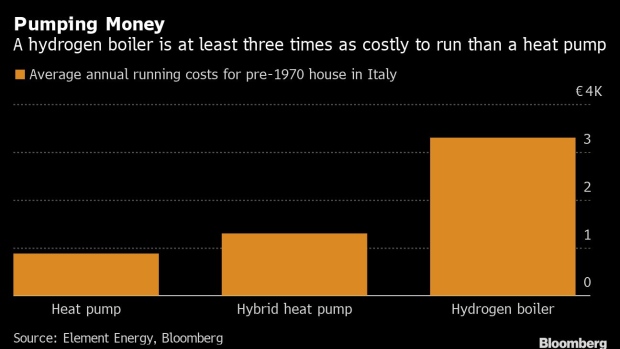Nov 25, 2021
Forget Gas and Hydrogen. Your Next Boiler Should Be a Heat Pump
, Bloomberg News

(Bloomberg) -- For all the hype surrounding hydrogen, the cheapest way to warm a home during the green transition will be a heat pump.
That’s the finding a new study by European consumer organizations, which said the pumps -- that draw heat from the surrounding air -- can help cut heating bills by a quarter compared with the cost of conventional gas boilers. The verdict on hydrogen-fueled boilers is severe: they “will never be a cost-effective option.” And the European Union and its member states should avoid supporting the gas in the residential sector, the groups said.
“Electrification -- whether by a heat pump or district heating in cities -- combined with energy efficiency improvements, will be much cheaper and convenient than hydrogen,” said Monique Goyens, director general at the European Consumer Organisation, BEUC. It’s “vital that consumers aren’t pushed into investing in expensive experiments, like hydrogen.”
Shielding vulnerable consumers from energy transition costs has become a key challenge to the EU’s plan to cut emissions and achieve carbon neutrality by mid-century. The recent surge in energy prices has exacerbated those concerns, putting the issue on the agenda of national leaders meeting in Brussels next month.
The European Commission, the EU’s executive arm, has emphasized the need to accelerate the shift away from fossil fuels, while endorsing measures to protect citizens from energy price rises. The consumer organizations, which include the umbrella group BEUC, said that bloc and member states should prioritize the rollout of heat pumps and avoid setting a target for blending hydrogen into existing gas networks.
Read more: U.K. Plans Subsidy-Driven Hydrogen Boost on Path to Net Zero
“Countries should provide grants of up to 100% of the initial investment needed for vulnerable consumers to make the switch,” the report said, adding that governments should guarantee funds so that banks can offer better interest rates to consumers.
The organizations commissioned Element Energy to undertake the analysis, which looked at the period from 2025 to 2040. That’s when legislation is being revised and encapsulates the average life span of a boiler.
©2021 Bloomberg L.P.


